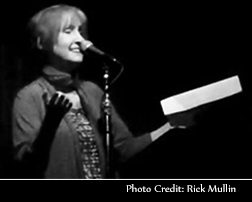The HyperTexts
Kate Bernadette Benedict

Kate Bernadette Benedict’s first poetry collection, Here From Away, came out
in 2003. Her second, In Company, appeared eight years later.
Earthly Use: New and Selected Poems was published in 2015 and includes
poems from both volumes, along with others heretofore uncollected. It is available on
Amazon, BN.com and Powells.
Kate has edited and published a number of online poetry journals: Umbrella:
A Journal of Poetry and Kindred Prose; Bumbershoot (Umbrella’s
lighter offshoot); and Tilt-a-Whirl, a poetry “sporadical” of repeating
forms. She has worked in the fields of book publishing and banking.
After living for 35 years on Manhattan’s Upper West Side, in 2011 Kate and her
husband John Leahy relocated to Riverdale, a leafy neighborhood in the Bronx.
Visit her online at www.katebenedict.com.
To buy her latest book, please use the hyperlink below:
Earthly Use: New and Selected Poems
We Are Refugees
In groups of two or three, we steal through breaches in the mountains.
In throngs, we shamble over trance-inducing sands.
We left our city to the interlopers, with their new weaponry.
We left our village to feral cats and the few dying elders.
We carry dry foodstuffs in woven cloths, and motionless infants.
The Holy Book we left behind, with our intricate carpets.
By this walking we know we live. Do our bowed heads still venerate?
We cannot say, nor do we speak of bleeding or any particular lack.
A little water may flow out of rock; we chance upon a small oasis.
To extinguish a morning’s thirst, to move on: it is enough.
There is nothing to want anymore, nothing to expect.
Nevertheless, a child is delivered, ululating in the reeds.
At night, when you fly over, count the holy prayer beads of our fires.
By day, with your instruments, note the many colors of our robes.
We hear from all directions sounds of strafing and detonation.
Is there no place left where we came from, then? None where we are going?
Originally published in DMQ Review and
Thanal Online
The Awkward Age
Ungainly years of stammering and spills
when nothing seemed to fit, not limbs or nose!
Smells abashed you, inconvenient flows.
With those you loved who loved you, you clashed wills.
With those you feared who mocked you, you allied.
Or else you joined a different, wayward crowd—
strength in numbers, cow them or be cowed—
though some escaped in books, or suicide.
I’m told all life derives from primal sludge,
atoms made cells and cells evolved to us
and if we stay the course we’ll still progress.
Our hot antagonisms will flare less
until we’re louts no more, or mutinous,
or bear our kind an adolescent grudge.
Earthly Use
A saintly-seeming gent with a saintly name proclaims it:
We are more than we appear to be.
Something beyond us shines through us.
I hope I am more than I appear to be.
In the bathroom mirror, the corners of my mouth droop
in an aspect of chronic dissatisfaction
and in the panes of store windows
I’ve seen my double charging forward
with a bearing of total self-importance.
Yet I too bear a saint’s name
and hope to be worthy of it someday.
Even now, at odd moments,
something like air from a bellows may strike me,
evanescent yet measureless,
suffusing me with hearth warmth and light.
Tonight, the vital coal stays cold.
I see God in the eyes of my poodle!,
a starlet on a talk show claimed
and I laughed at her, pleased by my own scorn.
Yet what did she see in her dog’s eyes, after all,
but innocence, credulity, docility,
an effortless uncritical craven love—
the typical qualities of saints
for which, thus far, I’ve found no earthly use.
Originally published in The Same and
Ancient Paths
Dust and Sin
A useful and quotidian perdition
has choked my home in strangleholds of dust.
My throat and lungs have borne it as they must.
Refurbishment’s achieved by demolition.
Dancing dust motes—angel dust—beguiled
me in a church once, in a shaft of light,
transfiguring my penitential fright:
I was a guilty, visionary child.
I am a dreamy, guilt-accustomed wife,
mindful always of a taint within:
the residue of some intrinsic sin,
the dusty nature of my hidden life.
Through my most grievous fault, we prayed
at Mass; self-loathing seemed the saintly mark.
I’d quail before the most benign remark
in those days; the quailing habit’s stayed.
And now this dust besets me, a fine silt
on surfaces, in corners, underfoot,
not a common house dust, more a soot,
a Vesuvian ash where corpses never wilt
but lie for eons in amazed repose,
arrested in a past in which they froze.
The HyperTexts
